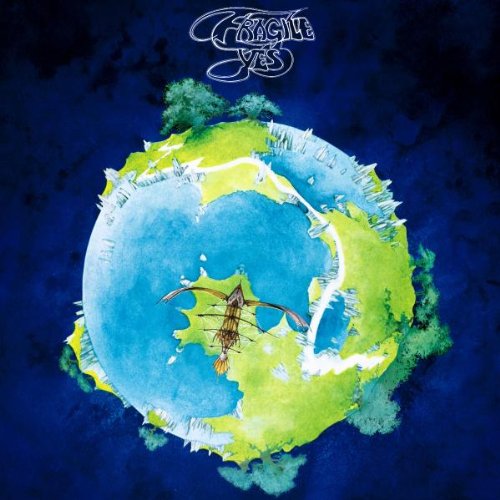
Fragile (1971)

1. Roundabout
2. Cans and Brahms
3. We Have Heaven
4. South Side of the Sky
5. Five Percent of Nothing
6. Long Distance Rundaround
7. The Fish (Schindleria Praematuris)
8. Mood for a Day
9. Heart of the Sunrise
Ask any devoted fan to name Yes’s finest moment, and chances are Fragile will land somewhere near the top—if not firmly planted at number one. And with good reason. This is the album that introduced the “classic” lineup—Anderson, Bruford, Wakeman, Howe, and Squire—often hailed as the band’s definitive incarnation, however fleeting their time together might have been. It also boasts their most recognizable song, Roundabout, a track that became the band’s unofficial anthem and has graced countless airwaves and concert setlists ever since.
And yet, despite its iconic status, Fragile isn’t without its quirks. While Roundabout is undeniably a great song—tight, melodic, and still musically daring—it’s hard to hear it now with fresh ears. Overexposure has dulled its shine for some, becoming the go-to track for radio programmers who might not know another Yes song if it walked up and introduced itself. Still, its importance can’t be understated. For many, Roundabout was the gateway into Yes’s sprawling universe.
The other milestone here is the arrival of Rick Wakeman. Replacing the more reserved Tony Kaye, Wakeman brought not only virtuosity but also flamboyance—both musically and visually. His command of the keyboard arsenal immediately expanded the band’s sonic reach, and his presence signaled that the band was ready to lean even harder into its progressive tendencies.
One notable wrinkle in the album’s structure is the inclusion of solo pieces from each band member. By most accounts, this was partly due to time constraints and the need to pad the record. The results are hit and miss. Bruford’s Five Per Cent for Nothing clocks in at a blink-and-you’ll-miss-it 37 seconds and feels more like a rhythm exercise than a composition. Wakeman’s Cans and Brahms, while ambitious, feels like a high-brow interlude rather than something essential. These solo fragments disrupt the album’s flow, and while they offer insight into each member’s style, one wonders if the space wouldn’t have been better spent on a full-band effort.
Fortunately, the full-band material more than makes up for the scattered solos. Heart of the Sunrise is a towering achievement—moody, dynamic, and emotionally resonant. It’s a rare long-form piece that sustains its energy and narrative from start to finish, even if the slow-burning intro feels like it lingers a touch too long. Long Distance Runaround offers a breezier contrast, and despite its brevity, it manages to sound both catchy and sophisticated. South Side of the Sky, arguably the sleeper hit of the record, sneaks up on the listener with its icy atmosphere and surprising warmth. It’s not a song for casual listening—it rewards attention with layers of interplay and unspoken tension.
If there’s a knock against Fragile, it’s the feeling that it could have gone a bit further. Strip away the solo showcases and insert one more proper track, and the record’s balance might have improved. Still, for an album that was reportedly assembled in a rush, it exudes confidence and cohesion. The band may have been under pressure, but you wouldn’t know it from the results.
Even with its structural quirks, Fragile remains a landmark release—bold, adventurous, and unmistakably Yes. If The Yes Album was the band finding its voice, then Fragile is that voice echoing across an open sky—clear, unwavering, and impossible to ignore.
Go to the Next Review
Go back to the main page